Coming up with fresh blog post ideas can sometimes feel overwhelming, especially when you’re trying to save time and resources. We’ve been through the same challenges and are here to help you, whether just starting out or running an established blog.
Over the years, we’ve learned that even the most experienced bloggers struggle to keep their content flowing. Finding new ways to engage your audience is a constant need in the world of blogging.
In this guide, we will share some of the quickest and simplest methods we’ve found to generate over 100 blog post ideas. These tips will help you create content that keeps your readers engaged while boosting your search traffic.

If you are in a hurry, here are the top tools to generate 100+ blog post ideas:
| Rank | Tool | Best for… | Price |
|---|---|---|---|
| 🥇 | WPBeginner Keyword Generator | Finding high-traffic keywords for blog post ideas | Free |
| 🥈 | LowFruits | Discovering low-competition keywords for blog topics | Paid |
| 🥉 | WPBeginner Blog Post Idea Generator | Generating creative blog post ideas quickly | Free |
| 🏅 | Semrush | In-depth keyword research for blog content ideas | Paid |
What Makes a Good Blog Post Idea?
As people who have been in the blogging space for a while, we’ve seen firsthand that not every blog post idea will hit the mark.
Whether you’re just starting a blog or have been blogging for years, coming up with ideas can take effort, time, and resources. But through trial and error, we’ve learned how to streamline this process.
Here are a few simple guidelines we follow when picking blog post ideas. These have helped us create engaging content that resonates with readers and ranks well in search results.
1. Topical Relevance
The blog post ideas you choose should always align with the main theme of your blogging niche or industry. From our experience, staying on topic helps maintain your audience’s interest and builds trust.
For example, if you run a travel blog, then branching out into unrelated subjects like pet care could confuse your readers.
Sticking to relevant topics also helps you build topical authority. Over time, search engines recognize you as an expert in your niche, which can give your site a boost in search rankings.
2. Search Volume / Audience Interest
One valuable tip for choosing blog topics is to consider audience interest. You want to make sure that the ideas you consider are things your readers are actively searching for.
You need a clear understanding of your target audience to do this effectively. Who are they, and what kind of content are they most interested in? Knowing this has been key in helping us deliver content that truly resonates with our readers.
Once you know your audience, it’s essential to check the search volume for your chosen topic. Search volume tells how many people are searching for a specific keyword, helping you focus on topics that can drive traffic.
3. Competition in Search Rankings
From our experience, a quick Google search can show you what your competitors are writing about a given topic. This gives you insight into what’s already out there and what gaps you can fill.
After checking the competition, you can create more comprehensive, valuable content that stands out. This approach has consistently helped us outrank competitors by offering something fresh and more detailed than what’s already available.
Now, let’s dive into how you can quickly find hundreds of blog post ideas in just a few minutes.
Quick and Easy Ways to Generate Blog Post Ideas (Free and Paid)
Multiple online tools can help you quickly generate blog post ideas. Some of them are paid, but plenty of them are available for free.
Let’s look at three of our favorite tools to generate blog post ideas.
1. Keyword Generator (Free)
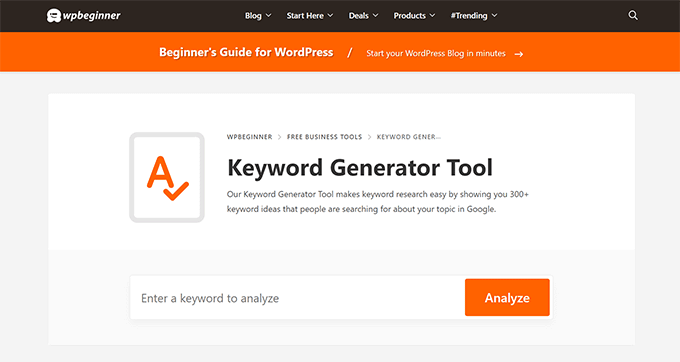
Keyword Generator is a free keyword research tool that we made at WPBeginner. It allows you to perform in-depth keyword research to find dozens of blog post ideas to write about.
Simply enter a topic or keyword that you want to work on and click on the ‘Analyze’ button.
The tool will then generate 300+ new keyword ideas from Google that you can browse or download as a CSV file.

These ideas can be sorted by the following:
- Alphabetical – Related keywords that people search for in Google in alphabetical order.
- Prepositions – Related keywords that include prepositions like for, near, is, to, and so on.
- Questions – Related long-tail topics organized as questions.
To see blog post ideas organized as an SEO topical entity graph, simply click the ‘Show graph’ button in any section.
You can also copy the SVG file of the graph to your clipboard.
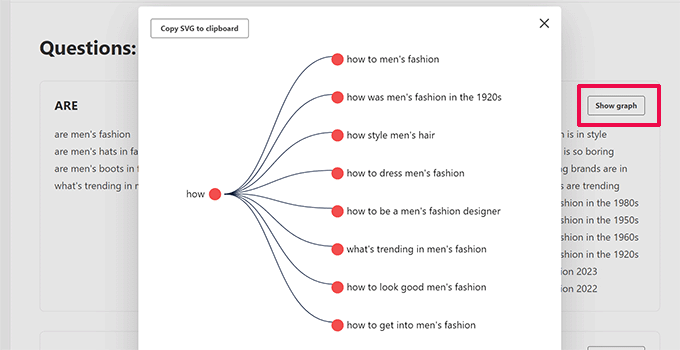
You can combine several article ideas in one blog post or create multiple content pieces to build authority around a topic over a period of time.
2. LowFruits.io (Low Competition Blog Ideas)
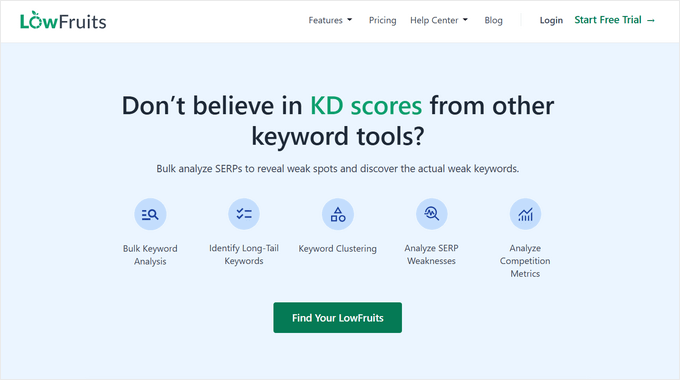
In our experience, LowFruits.io is a highly effective tool for generating blog post ideas that can rank well in search engines.
What sets it apart is its focus on discovering low-competition, high-potential keywords that you can actually rank for, especially if your blog doesn’t have a high domain authority.
One of the standout features is its Keyword Finder, which uses advanced algorithms to analyze Google’s autocomplete data and provide long-tail keyword suggestions.
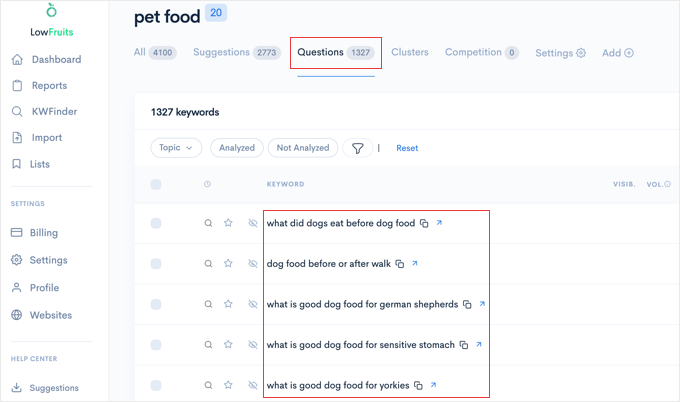
This has helped us uncover untapped topics that our audience is searching for but competitors haven’t fully covered.
The SERP Analyzer is another powerful tool. It scans the top 10 Google results for your target keyword and highlights weak spots where lower-authority websites rank.
This makes it easier to target blog post ideas with a realistic chance of outranking competitors.
What we also love about LowFruits.io is its Keyword Clustering feature. This allows us to group related keywords, making our content more comprehensive and authoritative. By targeting similar keywords in a single post, we can increase the chances of ranking for multiple terms.
LowFruits.io also has additional tools like a Rank Tracker, Domain Explorer for backlink opportunities, and a Sitemap Extractor to view competitors’ content structures. These features have been invaluable in helping us stay ahead in the content game.
3. Blog Post Idea Generator (Free)
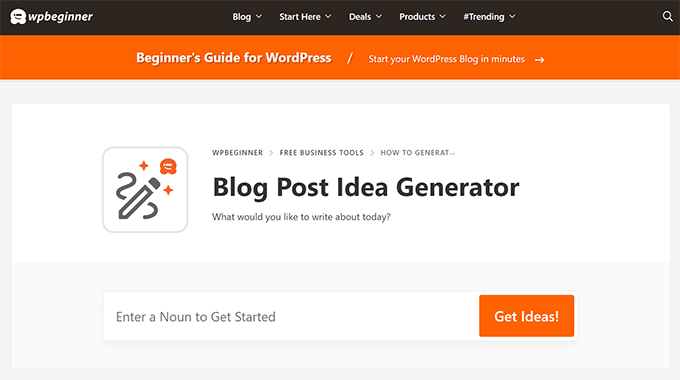
Blog Post Idea Generator is a free tool we created at WPBeginner to help our readers brainstorm blog ideas more easily. We’ve used it ourselves to generate fresh content ideas quickly, and it has become an essential part of our workflow.
All you need to do is enter your main topic or a related keyword in the search field, then click on the ‘Get Ideas’ button.
From there, the generator provides a list of blog post ideas you can write about. We’ve found this especially helpful when you’re stuck and need a creative spark to keep the content flowing.

Once you have a list of ideas, you can copy the ones that resonate with you and start building your own custom list. We regularly use this to streamline our content planning process and keep ideas organized.
From there, you can refine the blog headlines to match your voice and goals. Pairing this with our WPBeginner Keyword Generator tool also helps explore topic ideas further and ensures you’re targeting keywords that will drive traffic to your blog.
4. Semrush (Detailed Search Data)

Semrush is one of the best SEO tools on the market. It offers the most comprehensive set of search engine and social media marketing tools.
Note: Semrush also offers a limited free account, which is suitable for beginners on a budget.
Semrush includes two tools that both work great for generating blog post ideas. We will now take a look at both of them.
- Topic Research Tool
First, there is the Topic Research tool. It allows you to enter a topic or keyword, and Semrush will generate content ideas around that topic.
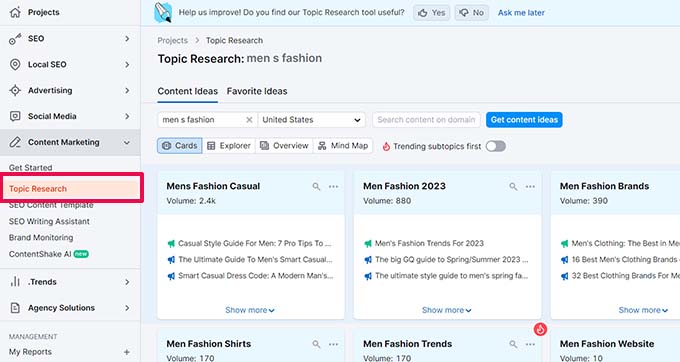
The results will show you related topics as cards that you can click to expand and view all the content ideas for that topic.
You will also see the subtopic search volume, how easy it is to rank for (the difficulty level), and the topic efficiency. Topic efficiency is calculated by considering both the search volume and the difficulty level.

For each subtopic, you will see results as article headlines. You can click on each headline to view the article on a competitor’s website. This gives you a good idea of the information you will need to cover in your blog post.
Next to headlines, you will see questions commonly asked by users about that subtopic. You can pick a question to answer in your article or combine several to make a more comprehensive blog post.
2. Keyword Magic Tool
The Keyword Magic tool is a powerful keyword research tool built into the Semrush toolkit. It allows you to simply enter a keyword or topic to find related keywords with a ton of useful data.
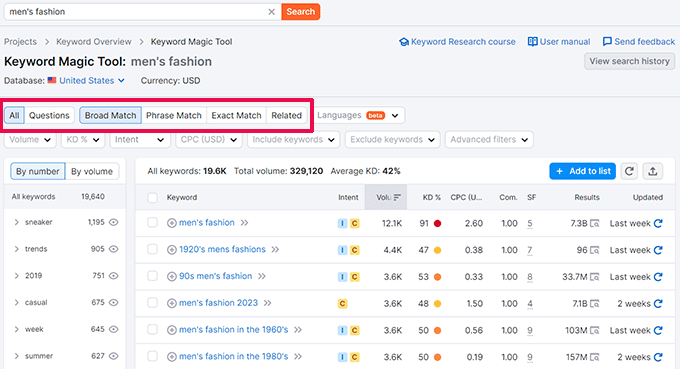
From here, you can sort the results by questions, broad, phrase, exact, or related matches.
Next to each keyword, Semrush will show you search volume, keyword difficulty, cost per click or CPC (for pay-per-click ads), and more.
You can also click on a keyword to view more detailed information about it, including the intent of visitors who search for it. For example, users might only be looking for informational content or may be looking to buy a product (transactional intent).

If you are using a paid Semrush account, then you will also see Keyword Clusters. These are semantically related keywords, which are different phrases related to a single topic. You can use them to create more authoritative content on any topic.
Bonus Tips to Find Blog Post Ideas
The tools discussed in this article can help you quickly generate hundreds of blog post ideas. However, you can do a few other things to refine these ideas and find more related topics to write about.
First, you can put your blog post idea in a Google search to see the competition.
As you type in your keyword or blog post idea, Google will start suggesting relevant topics that other users searched for.

You can include those topics in your blog post or save them to check later.
On the search results page, you will see your top competitors. Visiting these results will give you an idea of how your competitors have covered this topic.
You may also see the ‘People also ask’ section. This shows related questions people are looking for about a particular topic.

These questions can be separate blog post ideas, or you can include them in your topic and make it more comprehensive. You might even include them in a frequently asked questions (FAQ) section to target the specific phrases within your content.
Finally, you will find related searches at the bottom of the page. These are relevant keywords and search terms that can be used as separate blog post ideas.

Optimizing Your Blog Post Ideas
The tools we have talked about usually just show you raw data. You may still need to come up with your own blog post title, content outline, and more.
You will also need to optimize your blog post to outrank the competition and get more search traffic.
The easiest way to do all this is by using the All in One SEO for WordPress plugin.
It is the best WordPress plugin on the market, allowing you to easily optimize your blog posts for SEO.
You first need to install and activate the All in One SEO for WordPress plugin. For more details, see our article on how to install a WordPress plugin.
Note: There is also a free version of All in One SEO available. However, we recommend upgrading to a pro plan to unlock the plugin’s full potential.
Upon activation, you can edit the blog post you are working on.
Then, go to the All in One SEO panel at the bottom of the WordPress content editor and enter a focus keyword for your blog post.
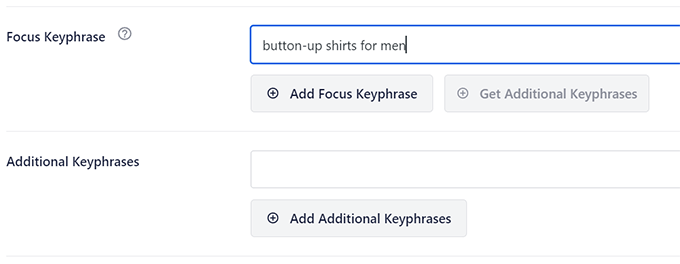
All in One SEO will now show you an SEO score for your blog post based on your main focus kephrase. A higher score tells you that your content is well-optimized for your main keyword.
The plugin will also show you practical recommendations to improve the SEO score.

You can also refine your blog post title by switching to the headline analyzer panel.
This free tool helps you optimize your blog post title to improve your organic click-through rate in the search results.
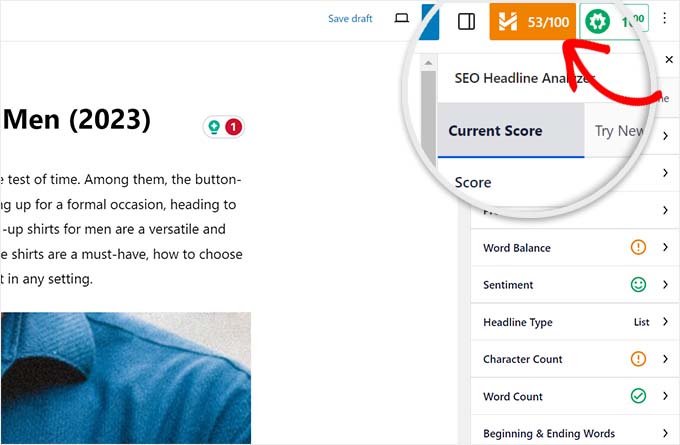
Need help coming up with engaging headlines for your articles? All in One SEO also comes with an AI-powered headline generator.
It uses openAI’s ChatGPT to generate SEO titles based on your content.
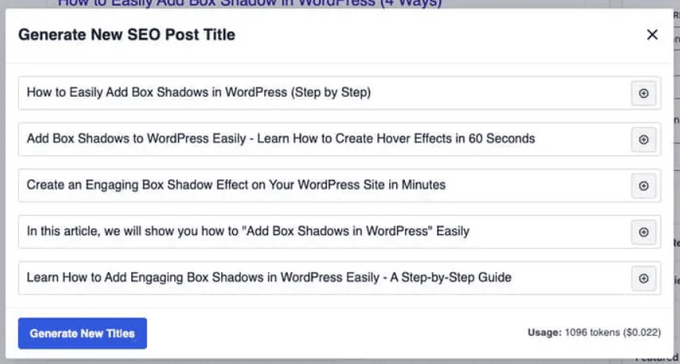
We hope this article helped you generate blog post ideas to fill up your editorial calendar for weeks. You may also want to see our complete WordPress SEO guide or take a look at the best blog examples to follow for inspiration.
If you liked this article, then please subscribe to our YouTube Channel for WordPress video tutorials. You can also find us on Twitter and Facebook.





Niall magner
I have chosen a headline for my next blog post but I don’t know what to say. Is it ok to use a blog post article generator?
WPBeginner Support
If you mean for the content in the article itself, you can use that for a rough draft but we would not recommend it for directly publishing to your site content as that can be penalized by search engines.
Admin
Jiří Vaněk
I would like to add to wpbeginner’s response that it’s not just about penalties, but also about facts. AI text generators, such as large language models, often tend to lie, fabricate false information, or write inaccurate facts. This means that if an AI generates such a text, a human must review and correct it to ensure the data is real and truthful. Otherwise, you could end up with a text full of misinformation. It’s important to be aware of this when using AI.
Hajjalah
I find SEMrush as a good option to find the best keyword ideas. But the only challenge i get is that ,
>>If i use high ranking keywords, My blog some times fails to get enough traffic from search engines due to high competition.
>>When i use medium ranking keywords, My blog also some times fails to get traffic to the blog posts due to limited searches from search engines.
Since I currently rely on search engine traffic to my blog, I don’t know how I can figure this out.
WPBeginner Support
We would recommend taking a look at our article below which covers how to do keyword research for your site!
https://www.wpbeginner.com/beginners-guide/how-to-do-keyword-research-for-your-wordpress-blog/
Admin
Jiří Vaněk
Try focusing on so-called long tail keywords. These are more like phrases than single words. For example, instead of the keyword “shoes,” you would use the long tail keyword “women’s high-heeled shoes.” These keywords are longer but more specific, and they will have much less competition while still being relevant for searches. Give this method a try and see if it helps.
Jiří Vaněk
I have personally transitioned to artificial intelligence. When my creativity runs low, it always suggests several avenues for me. Then, I usually use SEMrush for keywords and often find something very interesting to write about. This way, I also come up with new topics, which allows me to learn new things.
WPBeginner Support
Thank you for sharing the steps you take
Admin
Ralph
At the beginning of blogging i was using just Google. Shor phrase and look what are suggested terms. Then after 2 years i combined it with answear the public. It is free tool and gives nice ideas. My friend is using semrush and says it is really nice but i want to try ahrefs now. Can you guys compare it?
WPBeginner Support
While we don’t have a direct comparison at the moment you may want to take a look at our article below:
https://www.wpbeginner.com/opinion/semrush-vs-ahrefs-vs-moz-which-one-is-better-pros-and-cons/
Admin
Ralph
Wow, you guys have everything! Thanks for the link i will definitely check it out!